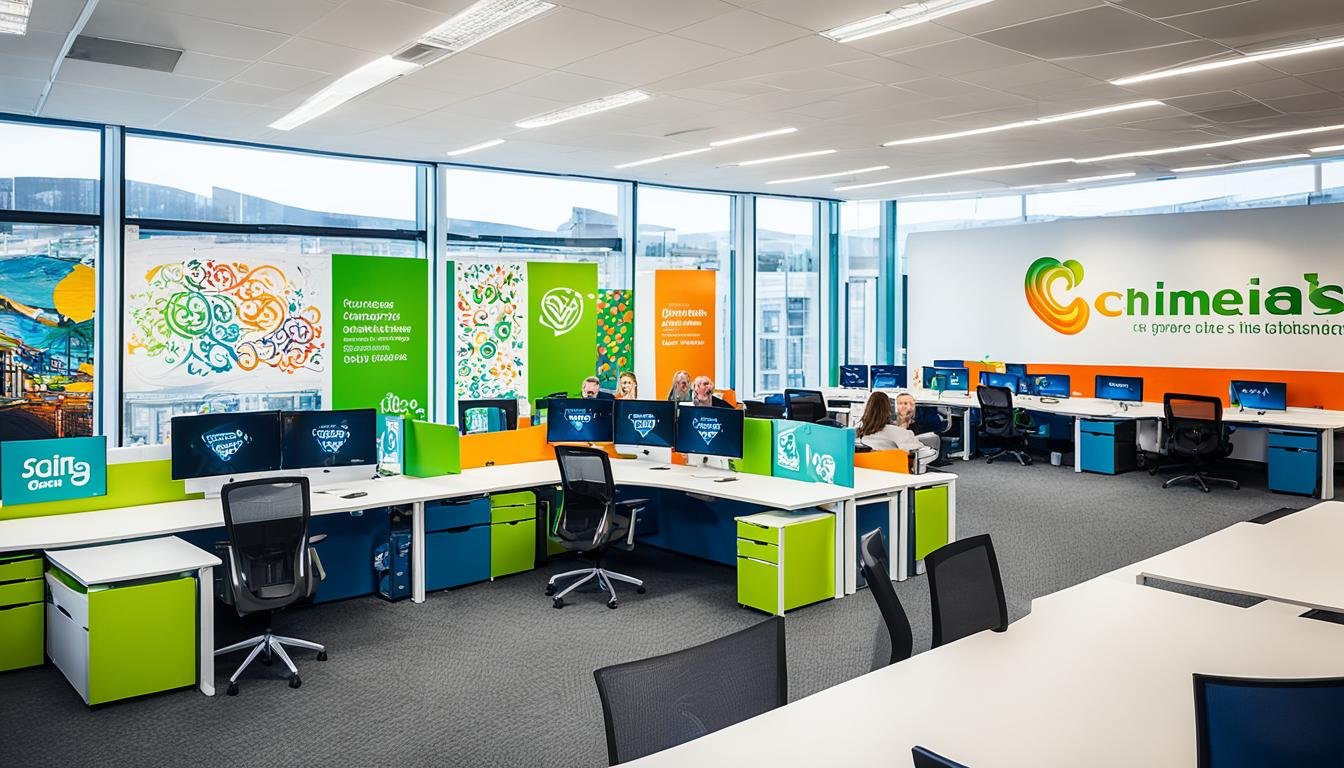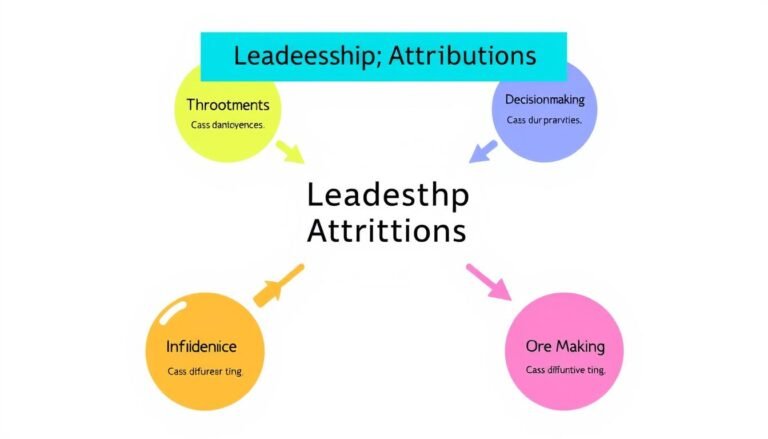Organizational Culture and its Impact on Performance in the Irish Context
Imagine starting your day at work in Ireland. Everyone chats over a cup of tea, setting a friendly tone. The day mixes hard work with light-hearted moments. This shows the heart of organizational culture in Irish workplaces.
Performance management in Ireland combines old and new ways in a special mix. Studies show how the culture influences how well people work. They found that being actively involved is key. Besides, four main things help make a great workplace: involvement, being consistent, adapting, and having a clear goal.
Experts like Pettigrew and Schein say organizational culture is about shared values and beliefs. In Ireland, this means a work environment full of strong friendships, fair leadership, and caring for employees. This kind of culture helps shape how workers act and what they think.
In the next parts, we’ll explore more about Irish organizational culture. We’ll see how it helps both the company and its employees succeed.
Key Takeaways
- Organizational culture significantly impacts performance in the Irish context.
- Involvement is the most crucial component influencing performance.
- Successful Irish workplace cultures blend traditional and innovative practices.
- Employee well-being and relationship-focused management are highly valued.
- Organizational culture shapes employee thoughts, emotions, and behaviors.
The Essence of Organizational Culture
Organizational culture is key for any company. It includes shared organizational beliefs, values, and norms. These shape how employees behave and work together.
Definition and Significance
Corporate culture affects employees’ thoughts, feelings, and actions. It creates an atmosphere for organizational ethics and company values. Teamwork and loyalty improve, decreasing turnover rates (Mayfield et al.). Edmondson’s studies show that a safe workplace boosts innovation. It makes employees willing to take risks and share ideas.
Core Components of Organizational Culture
The core parts of organizational culture involve its mission and vision. These set its main goals and future goals. They also detail the social structure, hierarchy, and workplace norms. This decides how jobs and roles are divided.
Bringing in new members is also crucial. It keeps the atmosphere of trust and respect strong for great results. Organizational beliefs shape not just individual actions but the company’s success. The hierarchy’s power distance affects how changes and decisions happen.
Psychological safety, per Baer & Frese, improves honest interactions. This boosts innovation in small to medium-sized businesses.
Unique Aspects of Irish Workplace Culture
In Ireland, workplaces stand out for their mix of new methods and old values. They focus on teamwork where everyone is heard. Each member is valued. This makes people feel they matter.
Collaborative and Relationship-Focused Management
In Ireland, work life is about relationships. This shows in how people work together and talk openly. Everyone is encouraged to solve problems and finish tasks as a team. The main goal is to get work done while keeping good relationships.
“Effective teamwork and genuine engagement form the bedrock of Ireland’s business ethos.”
Irish work ethics are about more than just working hard. It’s also about getting along with others. Managers listen to their team’s ideas, making everyone feel equal. This makes for happier employees and a better place to work.
Emphasis on Employee Well-being
Ireland puts its employees’ happiness first. It has rules that help people balance work and life. This leads to better work and happier people. The companies offer time off and work flexibility. They also make sure the workplace is safe and healthy.
Workers like knowing they’re doing well and getting credit for it. This keeps them happy and working well. It also helps them get along with others. Together, this makes a great approach to taking care of employees.
Irish workplaces show that mixing good relationships with caring for employees’ well-being works. It leads to places where people are happy, work well together, and still have time for themselves. This brings success that lasts.
Hierarchy and Leadership Style in Ireland
In Ireland, organizations have a democratic approach to hierarchy. There aren’t big gaps between those who lead and the employees. This means everyone is encouraged to speak up and be heard.
Democratic Approach to Hierarchy
The country’s workplaces often use a democratic way of organizing. This means decisions are made together and everyone is given power. It creates a place where the boss talks to the worker easily.
This way of working makes people feel like they own their part of the company. This is good because it helps everyone focus on doing better in the future, learning from what they did in the past, and setting important goals.
Open Communication and Feedback
In Ireland, leaders work hard to keep the lines of communication open. They listen to what everyone thinks. By doing this, they make sure that each worker’s ideas are appreciated.
When everyone feels like they can share their thoughts, something amazing happens. Companies become better because everyone is working together on great ideas. This improves how the whole business does its job.
The following data on PM system objectives illustrates the emphasis on feedback mechanisms within Irish organizations:
| Objective | Public Sector | Private Sector |
|---|---|---|
| Agreeing on Key Objectives | 85% | 78% |
| Improving Future Performance | 70% | 72% |
| Providing Feedback | 65% | 68% |
These efforts keep everyone, even those working only for a short time, connected to the company’s goals. This makes every individual happier and makes the team stronger.
The Role of Flexible Work Arrangements
Flexible work arrangements are changing how we work in Ireland today. This change is needed because people want more freedom and ability to change their work schedules. With options like working from home becoming more common, both employees and employers see benefits. Job happiness and getting work done well have improved because of this.
By 2024, the EU wants parents to have the right to ask for flexible work if they have kids under eight. In response, Ireland has started to update its work rules. In 2021, they began to talk about giving more employees, not just parents, the right to work flexibly.
The Citizen’s Assembly pushed for a law that gives everyone a fair chance at flexible work. In line with this, a new bill in Ireland suggests parents should be able to ask for flexible work until their kids are eight. This would be for taking care of the children.
Every country has its own rules on flexible work, some focused on helping carers, others aiming at everyone. In Europe, laws on flexible work have been getting better because of older rules already in place. In Ireland, these work flexibility laws are part of a separate section from time-off laws.
New studies from several universities in Karachi show that flexible work really helps with balancing work and life. It finds that when people can work flexibly, they like their job more. This connection highlights the value of offering flexible work to employees. It helps them be happy, work better, enjoy life outside work, and be more productive.
Despite the growing need for flexible work, there aren’t enough jobs that offer it. To know more about this issue, the CIPD Good Work Index looks at job quality in the UK each year. It helps make jobs better for everyone. The need for flexible work, including choosing when and where to work, is increasing.
| Country | Legislative Approach | Scope | Coverage |
|---|---|---|---|
| Ireland | Employment Law | Parents with caring responsibilities | Employed Parents |
| UK | Aggressive with Yearly Index | All Employees | All Workers |
| Germany | Built on Existing Framework | Parents and Carers | Various Sectors |
Impact of Organizational Culture on Employee Performance
Learning how organizational culture affects staff output is key to better work results and success. Studies show a clear tie between this culture and how well employees work. This underlines the need for strong values and beliefs in the workplace.
Positive Workplace Culture and Productivity
A good workplace culture boosts how well people do their jobs. When leaders create a culture of common goals and beliefs, it drives up motivation and keeps the business strong. A tool called a balanced scorecard highlights this, showing that strong cultures lead to better work.
Elements like how power is spread, if people are encouraged to be themselves, and how they handle risky situations, affect teamwork. Teams working well together to meet targets is key. This is especially true in diverse settings where people come from different cultures and backgrounds.
Importance of Recognition and Praise
Recognizing and praising hard work keeps employees keen and wanting to stay. In Ireland, making praise part of the culture helps people feel valued. This leads to better performance. Recognizing achievements properly respects cultural values while also boosting the workplace vibe.
Small cultures within an organization, formed around different places or goals, decide how well praise programs work. Tailoring these programs to fit these small cultures improves their impact. It ensures everyone knows they’re valued.
To wrap things up, a positive culture, plus genuine recognition and praise, have big impacts. They boost how well people work, make the workplace more effective and keep talent. The key is to focus on clear values and adapting praise systems to fit in with the culture.
Cultural Impact on Business Decision-Making
Knowing how Irish workplaces operate is key for making good decisions. They are not very keen on quick changes or risks. Instead, they like to introduce new things slowly. They feel this protects them from possible long-lasting damage of failure.
Medium Tolerance for Change and Risk
Irish companies approach new ideas with care. They pick up on innovations quicker if their success is proven. This careful attitude is backed by research showing that strong, consistent strategies lead to success.
Being in tune with Irish culture could boost a company’s revenue and profit. Companies making innovations that match their purpose are more successful.
Collaborative Approach to Problem Solving
In Ireland, working together is a big deal when solving problems. They make sure everyone involved helps make decisions. This way, they can adapt and overcome challenges better.
This team-focused culture in Ireland has clear benefits. Companies see less people leave and more people recommend them. They’re also better at keeping employees happy within the first year they join.
And when businesses merge, having similar cultures matters a lot. Around 95% of leaders think so too.
Cross-Cultural Management in Irish Organizations
Cross-cultural management is key in today’s Irish businesses. This is especially true with more migrant workers and the big role of global companies. The business scene in Ireland has changed thanks to the global economy. Companies now work with people from many cultures. They’ve had to learn new ways to manage that respect all these cultural differences.
Ireland has also been shaped by big international companies. They have shared their management styles and brought in policies that are inclusive. This has helped improve how different cultures work together in Irish workplaces.
Integration of Migrant Workers
Bringing migrant workers into the Irish job market shows the country’s openness to Diversity and Inclusion. As the number of global workers grows, Irish companies are gaining from the skills these new workers bring. Research has shown that understanding different cultural aspects is important. It helps reduce misunderstandings and makes the most of what these new workers can offer.
Managers are advised to adjust how they act and to offer specific training to connect with these workers better.
Impacts of Multinational Companies
Multinational companies have had a big effect on Irish businesses. Thanks to projects like GLOBE, we know of different leadership styles that work with various cultures. These global companies have introduced improved leadership methods. This has made Irish workplaces more respectful of everyone’s culture.
When global companies bring in their ways, they also face challenges from Ireland’s own established cultural norms. This can sometimes slow down efforts in entrepreneurship. Overcoming these challenges is vital for a successful and inclusive global work environment.
High Performance Work Systems (HPWS) in Ireland
High Performance Work Systems (HPWS) are crucial in managing people in Ireland’s businesses. They bring big benefits in every part of how well a company does. These systems focus on finding the best team members, helping them grow, and paying them well. Their main aim is to make sure everyone works towards the same goals, both personally and for the company.
Implementation and Benefits
Using HPWS in Irish companies has made a big difference. They’ve seen better financial results, produced more, and come up with new ideas. Let’s look at some of the good things that have happened:
- More money coming in, and more profit.
- A workforce that works well and gets things done.
- Doing a better job and making customers happy.
- Coming up with new ideas all the time.
- More teamwork and trust among coworkers.
Role in Enhancing Firm Performance
Studies in Ireland often talk about how HPWS makes companies better. One study looked at 93 accounting firms and saw that HPWS really helps. It does this by empowering employees, getting people to work together, and getting them to care about the company. The research showed that companies that use HPWS are more successful based on different measures.
Plus, research that compared Irish and Chinese professional service firms found something interesting. It showed that each country’s culture affects how well HPWS works. The research used theories to explain that HPWS help companies become better by improving their resources and focusing better on their markets and strategies.
In summary, HPWS are changing how businesses in Ireland operate, making them more focused on doing well. By making sure everyone is working together towards the same goals, these systems boost growth and new ideas. They highlight how important it is for people to communicate, coordinate, and work together to succeed.
Organizational Behavior and Employee Engagement
Today’s workplace is full of surprises. We call it VUCA – volatility, uncertainty, complexity, and ambiguity. To succeed, we need to understand how people in organizations work together. Positive leadership makes a big difference. It brings confidence and teamwork, vital in a world of rapid change.
Strategies for Effective Engagement
Want to boost Employee Engagement? Here are some key steps:
- Open Dialogue: Talking openly and honestly builds trust and involvement.
- Employee Empowerment: Letting staff make choices increases their dedication.
- Recognition and Praise: Praising good work often raises team spirit and involvement.
Building a Positive Organizational Climate
Making a good workplace is crucial for high Employee Engagement. Here’s how you can do it:
- Trust and Respect: Building a culture where trust and respect are key.
- Shared Purpose: Having common goals that unite everyone’s efforts.
- Positive Leadership: Leaders who show positivity improve everyone’s commitment and keep the team on track.
It’s all about how people and organizations connect. A smart mix of the right culture and employee behavior is key.
Today’s companies must be ready to handle change. They need strong Engagement Strategies and places where people love to work. By using the right tools, like the Competing Values Framework, companies can make sure their teams are happy and work well.
| Engagement Strategy | Impact on Employee | Impact on Organization |
|---|---|---|
| Open Dialogue | Increased Trust | Enhanced Communication |
| Employee Empowerment | Higher Commitment | Improved Decision-Making |
| Recognition and Praise | Boosted Morale | Higher Productivity |
| Positive Leadership | Greater Job Satisfaction | Increased Loyalty |
Conclusion
Understanding company culture is key in Ireland’s business success journey. Using democratic leadership and promoting open talks, Irish companies have built strong teamwork. This boosts both workers’ happiness and how well they work, leading to business success.
In studies, Ireland’s Civil Service showed high engagement levels, with 72% saying they were engaged. This shows the importance of fitting grade structure and a culture where new ideas are welcomed. But, some areas like the Performance Management System still need work. Businesses doing well usually have a culture everyone believes in and leaders who adapt well.
Mixing cross-cultural skills and advanced work systems helps companies even more. For example, at the International Conference on Economic Business Management and Accounting, experts pointed out that using AI with smart leadership strategies leads to lasting growth. As business methods evolve, it’s crucial for companies to understand different cultures, lead with a fresh vision, and use AI wisely. This will help Irish businesses thrive globally and keep their high standards.
FAQ
What is the significance of organizational culture in Ireland?
In Ireland, the way companies work together is key. They focus on working as a team and building strong relationships. This makes employees feel good and work better. Their way of working is open, fair, and they communicate well.
How does employee well-being impact productivity in the Irish workplace?
Employee well-being is a big deal in Ireland. When workers are happy and feel they matter, they do better. They put more effort in, and this boosts what the company achieves. Irish companies care about balancing work and personal life to make this happen.
What are the core components of organizational culture?
The heart of a company’s culture is what they all believe in and how they act. It’s about their goals, how they organize themselves, and how they welcome new people. These aspects create the company’s spirit and guide how everyone acts.
How does the Irish approach to hierarchy differ from other business cultures?
In Ireland, leaders often work closely with their teams. They listen and share with everyone. This makes the team stronger because everyone feels they have a voice and are important. It’s a more equal way of working together.
What role do flexible work arrangements play in Irish companies?
Flexibility in work is very important in Ireland. It shows that they trust their employees and support their needs. Giving people choices in how they work makes them happier and more focused. It’s a key part of having a good work-life balance.
How does organizational culture affect employee performance?
The way a company does things can really impact how workers do their jobs. When employees know they are valued and their hard work is recognized, they do even better. Positive recognition makes employees more motivated and productive.
How does Irish workplace culture influence business decision-making?
In Ireland, there’s a blend of sticking to what works and being open to new ideas. When problems come up, everyone puts their heads together to find the best solution. This leads to well thought-out and fair choices.
What is the significance of cross-cultural management in Ireland?
In Ireland, managing different cultures is critical because of the diverse workforce and many international companies. Being open and understanding different ways of working enriches the teamwork and creativity in companies.
What are High Performance Work Systems (HPWS) and their benefits in Ireland?
HPWS are plans to make your workers the best they can be. In Ireland, they’re known for boosting how much money a company makes, the quality of work, and new ideas. They’re good for all kinds of businesses.
How can companies build a positive organizational climate to enhance employee engagement?
Creating a happy, respectful, and focused work atmosphere is vital for any company. This happens when workers feel they can trust their company, have a clear goal, and are offered opportunities and recognition along the way. It boosts job satisfaction and loyalty.
Source Links
- Untitled-2
- (PDF) Impact of Organizational Culture on Organizational Performance: An Overview
- Understanding How Organizational Culture Affects Innovation Performance: A Management Context Perspective
- Microsoft Word – 7. ER RHAIMINI_CHARAF_ OC_OP_Mediator.docx
- The Irish Management Style
- Ireland – Culture, Traditions, Cuisine
- Performance Management in Irish Public and Private Sector Organisations: Moving Towards Multicultural Performance Management Practice
- How leadership styles can motivate teams and influence organisational cultures in a Small or Medium Sized Enterprise, Ireland
- Flexible Working Arrangements: Overview & comparative research
- Relationship between Flexible Working Arrangements and Job Satisfaction Mediated by Work-Life Balance: Evidence from Public Sector Universities Employees of Pakistan
- CIPD | Flexible Working Practices | Factsheets
- Microsoft Word – IRMBR-0021, 168-175.pdf
- The Impact of Organizational Culture on Corporate Performance
- The Impact of Organisational Culture on Business Performance
- The Impact of Culture on Business Negotiations
- JIS_Vol7_No2_FINAL.pdf
- The dynamics of culture, organisational culture and change – AI & SOCIETY
- Organizational Culture in a Cross-Cultural Context
- Chinese and Irish professional service firms compared: Linking HPWS, organizational coordination, and firm performance
- The Role of Employee Behavior and Organizational Culture in Strategy Implementation and Performance in a VUCA World
- The effect of collectivism-based organisational culture on employee commitment in public organisations
- Positive leadership and employee engagement: The roles of state positive affect and individualism-collectivism








